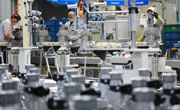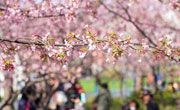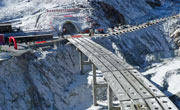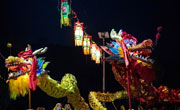Tokyo Metropolis(Japan)
Tokyo Metropolis(Japan)
[Overview] Tokyo Metropolis is the capital and largest city of Japan, as well as the political, economic, cultural, educational and transportation center of the country. Located in the middle of the Japanese archipelago, Tokyo covers an area of 2,188 square kilometers and has a population of 13.95 million. It consists of a mainland portion, as well as the Izu Islands and Ogasawara Islands on the Pacific Ocean, with the Sumida River and Arakawa River running through the city proper.
[Politics] Tokyo Metropolis is governed by the metropolitan assembly and the metropolitan government. The Tokyo Metropolitan Assembly is made up of 127 members directly elected by Tokyo citizens to serve a term of four years. It has the authority to enact, amend, and repeal metropolitan ordinances, approve the budget and certify its settlement. The consent of the Assembly must be sought for important appointments, nominations, and other designations made by the governor such as those of a vice governor or administrative commission member. The Metropolitan Government has seven commissions, including the Personnel Commission, the Public Safety Commission, the Board of Education, etc., and 22 bureaus, including the Bureau of General Affairs, Bureau of Urban Development, Bureau of Social Welfare and Public Health, Bureau of Citizens and Cultural Affairs, etc. There is one governor and four vice governors in the government. The governor is directly elected by the citizens and has a four-year term of office. The incumbent Governor Yuriko Koike took office in July 2016.
[Economy] As Japan's economic center, Tokyo Metropolis has a highly developed service sector and major industries such as precision machinery, auto-making, electronics, the chemical industry, electrical machinery, metallurgy, shipbuilding, foodstuff, publishing and printing. Tokyo hosts the headquarters of many large Japanese and foreign enterprises and banks, while small and medium-sized enterprises also play an important role in the local economy, accounting for over 90% of all enterprises in the city.
[Transportation] Tokyo Metropolis boasts highly developed sea, land and air transportation networks, as well as an intra-city transportation network centered on rail transit, which carries over 85% of all passengers of the entire urban traffic system.
[Culture and Education] As Japan's educational and cultural center, Tokyo Metropolis is home to one third of the country's universities, over half of its college students, 80% of publishing houses, as well as lots of museums, art galleries and libraries. As an international metropolis, the city often hosts international cultural events of various types, including the Tokyo Music Festival and Tokyo International Film Festival.
[Building of sub-centers and the National Capital Region] Tokyo started to build its sub-centers in 1960 and has built seven of them so far. To relieve the pressure of the city and promote coordinated development of a larger region, the National Capital Region has taken shape after over half a century of planning and governance efforts. This region covers Tokyo Metropolis and seven the prefectures of Chiba, Saitama, Kanagawa, Ibaragi, Tochigi, Gunma and Yamanashi.
[Relations with Beijing] On March 14, 1979, Tokyo Metropolis officially became Beijing's first sister city. The two sides have had close interactions and fruitful cooperation since then and former Chinese Premier Li Peng once hailed this as an excellent model of sister cities.
In the 1980s, exchanges and cooperation with Tokyo Metropolis supported Beijing's economic and social development as well as its opening-up in the early stage. The food sanitation inspection vehicles, municipal sanitation vehicles and fire engines provided by Tokyo Metropolis served as great references for Beijing's independent R&D of similar special-purpose vehicles. It was with the help of Tokyo Fire Department that Beijing established its first firefighter training school. Beijing also introduced a range of technologies from Tokyo, including construction plastering technology, anti-mildew technology for soy sauce, production stability technology for key camera components, measurement of iodine contained in food, and testing of aflatoxin.
Over the past 40 years, Beijing and Tokyo Metropolis have had exchanges in all aspects, on multiple levels, and in a wide variety of fields, carrying out a total of 24 cooperation projects centering on the construction of the capital region, refined city management, air pollution prevention and control, and many other topics. In 2019, to celebrate the 40th anniversary of the formation of the sister-city relationship between the two cities, leaders of the two sides paid mutual visits and signed a memorandum for communication and cooperation in Beijing, aiming at pragmatic cooperation in scientific and technological innovation, urban planning, education, sports, and old-age care. In Tokyo, there was also a series of activities to mark the occasion, including the Night of Beijing art show, Beijing Week and Exhibition in Celebration of the 40th Anniversary of the Formation of Sister-City Relationship between Beijing and Tokyo. These events presented Beijing to Tokyo residents in an all-round manner and from different perspective, contributing to the exchanges and cooperation between the two sides in all aspects.
东京都(日本)
【概况】东京都是日本国首都和最大城市,全国政治、经济、文化、教育中心和交通枢纽。位于日本列岛中部,由陆地和位于太平洋上的伊豆诸岛及小笠原诸岛组成,隅田川、荒川等流经市区内部,面积2188平方公里,人口1395万。
【政治】东京都管理机构包括都议会和都厅(政府)。都议会具有制定和修改地方法规、审批预决算、表决副知事和政府部门主要负责人等重要人事任免等职能。都议会由127名议员组成,通过市民直接选举产生,任期4年。东京都厅下设人事、公安、教育等7个委员会,总务、城市规划、卫生、生活文化等22个局(厅)。都厅除知事外,另有4名副知事。知事由市民直接选举产生,任期4年。现任知事小池百合子于2016年7月就职。
【经济】东京都是日本经济中心,服务业发达。主要产业包括精密机械、汽车制造、电子、化工、电机、冶金、造船、食品、出版、印刷等。聚集了众多国内外大企业和银行总部。中小企业在东京都地方经济中占有十分重要的地位,其数量占东京都企业总数90%以上。
【交通】东京都有四通八达的海、陆、空交通网络和以轨道交通为主体的城市交通网。其中,轨道交通客运量占城市交通总客运量的85%以上。
【文化教育】东京都是日本教育文化中心,集中了全国1/3的大学和一半以上的大学生,全国80%的出版社和众多的博物馆、美术馆、图书馆等。作为一个国际化大都市,东京都经常举办各种国际文化活动,如东京音乐节和东京国际电影节等。
【副中心及首都圈建设】东京都自1960年起逐步推进副中心建设,目前已建成7个副中心。此外,为缓解东京都压力,带动区域协调发展,日本历经半个多世纪规划治理,逐步形成以东京为核心,包括1都(东京都)7县(千叶、埼玉、神奈川等内圈三县和茨城、枥木、群马、山梨等外圈四县)的首都圈。
【两市交往】1979年3月14日,北京市与东京都正式建立友好城市关系,东京都成为我市第一个国际友好城市。结好以来,两市交往密切,合作成果显著,曾被李鹏总理誉为“国际友好城市的典范”。
20世纪80年代,与东京都的交流合作为我市经济社会发展和对外开放提供了早期支持。东京都提供的食品卫生监督车、环卫车和消防车,为我市自主研发专业车辆发挥了重要借鉴作用。在东京都消防厅帮助下,我市建立了第一所消防学校。建筑抹灰技术、酱油防霉变技术、照相机关键零件的生产稳定性技术、食品中碘的测定方法、黄曲霉素的检测方法等,均是东京都引进我市的技术项目。
结好40年来,北京市与东京都形成了全方位、多层次、宽领域友城交往格局,双方就“首都圈”建设、城市精细化管理、大气污染防治等开展了共计24个合作项目。2019年是两市结好40周年,以此为契机,两市高层实现互访,并在京签署交流合作备忘录,重点在科技创新、城市规划、教育、体育、养老等领域开展务实合作。在东京举办的“北京之夜”文艺演出、“北京周”和“纪念北京—东京结好40周年回顾展”等系列纪念活动,全方位、多角度展示北京城市形象,推动两市各领域交流合作。
(Source: Foreign Affairs Office of Beijing Municipal Government)
[ Editor: WPY ]










More From Guangming Online
Medics from Fujian leave for Shanghai to aid in battle against COVID-19 resurgence
New int'l land-sea transport service to Indo-China Peninsula launched
Another makeshift hospital under construction in Shanghai
Tourists view tulips in Suiping County, Henan
In pics: blooming gagea flowers on grassland in Zhaosu, Xinjiang
Greek workers stage 24-hour general strike over high prices